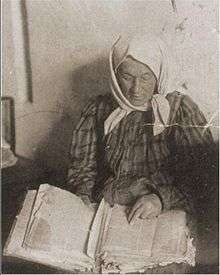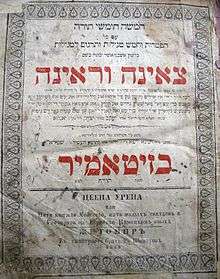Tseno Ureno
The Tseno Ureno (Yiddish: צאנה וראינה), also spelt Tsene-rene, Tz'enah Ur'enah, sometimes called the Women's Bible, is a Yiddish-language prose work of c.1590s whose structure parallels the weekly Torah portions and Haftarahs used in Jewish prayer services. The book was written by Jacob ben Isaac Ashkenazi (1550–1625) of Janów Lubelski (near Lublin, Poland), and mixes Biblical passages with teachings from Judaism's Oral Torah such as the Talmud's Aggadah and Midrash, which are sometimes called "parables, allegories, short stories, anecdotes, legends, and admonitions" by secular writers.[1]

The name derives from a verse of the Song of Songs that begins Ṣʼenā urʼenā bnoth Ṣiyyon (צְאֶנָה וּרְאֶינָה בְּנוֹת צִיּוֹן, "Go forth and see, O ye daughters of Zion", (Song 3:11)). The nature of the source of the name indicates that the book was intended for women, who would have been less versed than men in Hebrew, the Jewish liturgical language. The title page of the Basel edition of 1622 acknowledged the book's sources as including the earlier popularizer Rashi (1040–1105) and the 13th century exegeses of Bahya ben Asher, as well as Talmudic sources.[1]
Sol Liptzin describes the Tseno Ureno as "a fascinating, didactic book which could win the approbation of the strict moral leaders of Eastern European Jewry, and at the same time accompany women as their favorite literary and devotional text from girlhood to old age. For generations there was hardly a Yiddish home that did not possess a copy."[1] The Tseno Ureno was common in traditional Jewish homes in Eastern Europe and followed its readers across the ocean. Yisrael Meir Kagan wrote of earlier generations reading the book "Tzenah urenah" each Sabbath.[2] The work had a significant impact on the dissemination of knowledge of the Bible and its commentaries among those who had not mastered the Hebrew language — mainly women.
Because of its orientation toward women readers, the book is particularly focused on the biblical matriarchs, the various courtships mentioned in scripture, and the rescue of Moses by Pharaoh's daughter. Although there are vivid depictions of Paradise and Hell, there is an emphasis that righteousness is to be found in serving God willingly and wholeheartedly, rather than out of hope of reward or fear of punishment. Charity and almsgiving are also emphasized.[1]
Editions and translation

There have been at least 300 editions of the book, starting in the 1590s.[3] According to the 1622 edition, the first three editions - one printed in Lublin and two in Kraków - had by then not survived.[4]
After the 1622 edition, which came out in two volumes (the Pentateuch; the Haftarahs and Five Scrolls), most were published as one volume and in a variety of formats (for example, each weekly portion together with its particular haftarah). Some editions were illuminated, and in the 17th century, a section of the first portion of Genesis was translated into Latin. At the end of the 18th century, publication of the Tseno Ureno shifted from Western to Eastern Europe. At this point considerable changes in the language of the writing became apparent. The book turned into a kind of living Yiddish-language laboratory, and had at the same time a significant influence on the development of Yiddish, both written and spoken. Some East European editions reflect the spirit of Hasidic Judaism or the Haskalah. In the 19th century, versions appeared in Western Europe with different purposes or aims — mainly Germanization of the language, modernization or actualization of the contents, and structural rearrangement — alongside partial translations into different languages. The title Tseno Ureno was sporadically used for other similar books of sermons and teaching of the Bible, and also appeared on the title page of a number of copies of the 1822 Basel edition of Moses Mendelssohn’s Bi’ur.
A number of later editions of the Tseno Ureno include various supplements, such as Yiddish translations of Targum Sheni on the Scroll of Esther, the book Naḥalat Tsevi on the Torah portions and the Scrolls, Judah Messer Leon's Nofet tsufim on the haftarahs, and selected portions of the Sefer haYashar Isaiah Horowitz's Shenei Luḥot HaBerit.
The 20th century saw full translations into English and Hebrew, as well as a partial translation into modern Yiddish.[5] Among these translations-adaptations we find Maskilic, Hasidic, and Zionist versions of the classic work.[6]
Parts of Tseno Ureno were translated into German in 1910 by Bertha Pappenheim as Zennah u-Reenah. Only the first part of her translation of the Women's Bible appeared (Bereschit, corresponding to the Book of Genesis).[7] The translations of the second and third books (Schemot and Wajikra) have apparently been lost.
Morris M. Faierstein published a first critical translation into English in 2017.[8]
The book continues in print today, especially for Hasidic communities.[4] ArtScroll published a two-volume English translation in 1993 (ISBN 0899069258), under the title The Weekly Midrash: Tz'enah Ur'enah the Classic Anthology of Torah Lore and Midrashic Commentary.
References
- Liptzin, Sol, A History of Yiddish Literature, Jonathan David Publishers, Middle Village, NY, 1972. ISBN 0-8246-0124-6. pp.10-11.
- What Do We Know About The Establishment of Beit Ya’akov?, Appendix: The Hafetz Hayyim's letters of support, Hafetz Hayyim's 1933 letter (translated by Dr. Yoel Finkelman): In the earlier generations, each family in Israel had a tradition of fathers and mothers to follow the path of Torah and religion and to read the book Tze'ena URe'ena on each holy Shabbat (Hebrew source: בדורות הקודמים היה לכל בית ישראל מסורת אבות ואמהות לילך בדרך התורה והדת ולקרות בספר "צאינה וראינה" בכל שבת קודש).
- Faierstein, Morris. "The Se'enah U-Re'enah: A Preliminary Bibliography". Revue des Études Juives.
- Katz, Dovid (2007). Words on Fire: The Unfinished Story of Yiddish (2 ed.). New York: Basic Books. p. 95. ISBN 978-0-465-03730-8.
- YIVO: Tsene-rene
- Journal, Muza; Schramm, Netta. "עדכון חילוני-ציוני לצאינה וראינה: עיון בדרשותיו של דוד כהן A secular Zionist Revision of "Tsene U'r'ene": Reading David Cohen's Homilies". מוזה: כתב עת שפיט לתלמידי מחקר במדעי הרוח.
- Zennah u-Reenah. Frauenbibel. Nach dem Jüdisch-Deutschen bearbeitet von Bertha Pappenheim. Bereschith. Erstes Buch Moses. Jüdischer Frauenbund (League of Jewish Women), Frankfurt. 1930.
- Ze'enah u-Re'enah. A critical translation into English. Part 1. Faierstein, Morris M. Berlin [Germany]. 2017-05-08. ISBN 978-3-11-046103-9. OCLC 1055596569.CS1 maint: others (link)
External links
- Tseno Ureno printed in Sulzbach, 1798
- Blitz, Avi. “The Tsene-rene: In Search of a Seventeenth-Century Yiddish Bible in Modern-Day Jerusalem.” In geveb, May 2019.
Further reading
- Norman C. Gore: Tzeenah u-reenah − a Jewish commentary on the Book of Exodus. Vantage Press, New York 1965